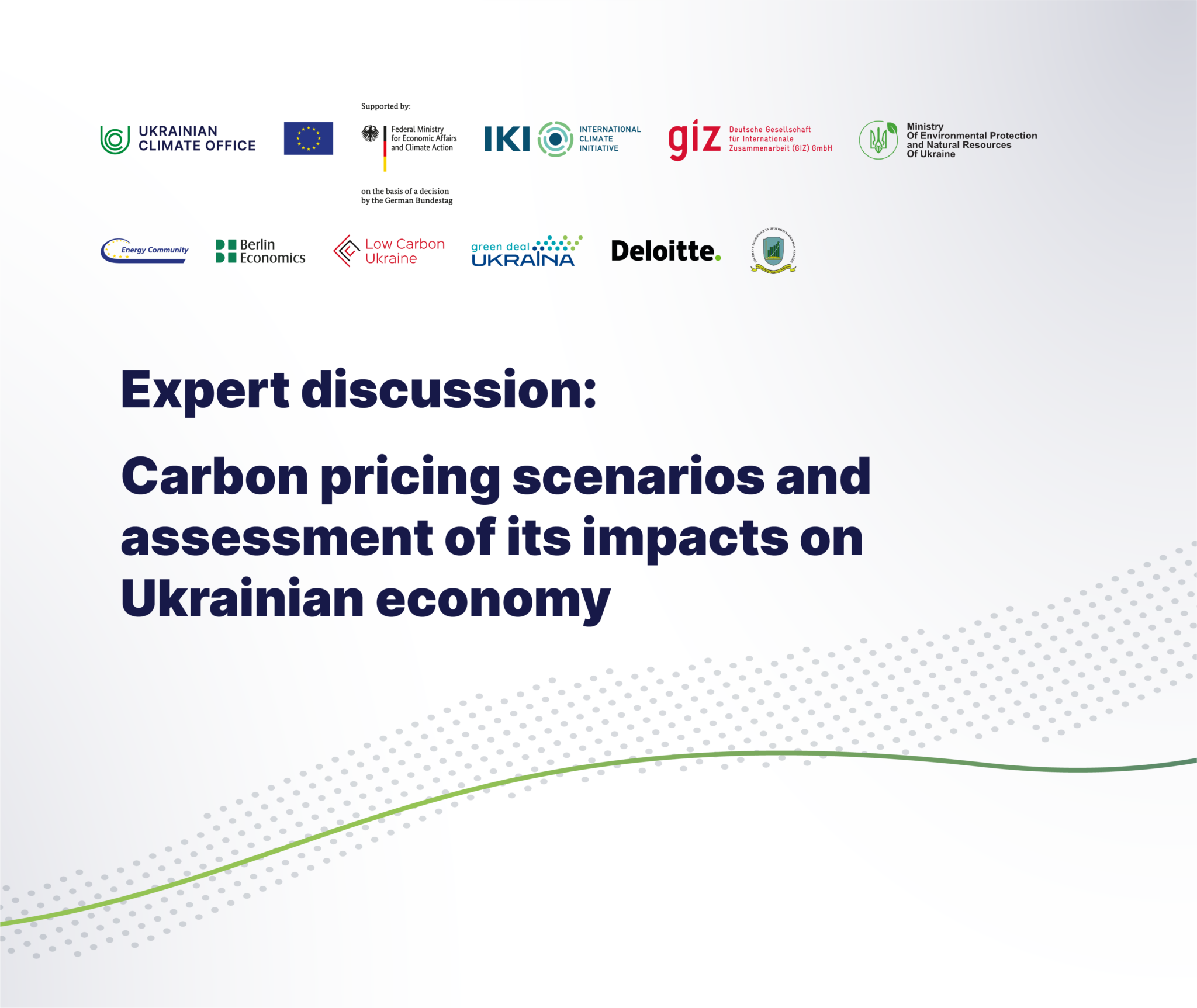Expert Discussion on Carbon Pricing and Economic Impacts: Insights, Challenges, and Solutions for Ukraine

Organized by the Ukrainian Climate Office this event provided a platform for stakeholders in climate action to exchange valuable analytics, share results of modelling activities on carbon pricing scenarios and assessments of possible economic impacts. The discussion addressed current challenges and solutions and identified ways to minimise economic impacts while advancing Ukraine’s climate goals.
“Carbon intensity of Ukrainian economy is more than three times higher than EU, so there is a general need to improve resource and energy efficiency and reduce emissions to increase its competitiveness. Besides, it is our commitment to the EU, so today is an important event, which is to become a platform for sharing experiences. We need to find a consensus that will allow us to reform carbon pricing both for economic growth and decarbonization”, – stated Pavlo Masiukov, Director of the Support for the Establishment of an Emissions Trading Scheme in Ukraine” Project, who moderated the event.
During 2024, Ukraine has already made big progress towards EU Climate reforms – adopted framework Climate Law, that envisages achievement of climate neutrality by 2050 and established the grounds for market-based mechanisms and instruments to support reaching the targets of state climate policy. The Emission Trading System (ETS) is indicated as one of the main market-based mechanisms for achieving climate neutrality. To establish this, the Ukrainian Government in collaboration with other stakeholders, is working on reactivating and mandating the Monitoring, Reporting and Verification system (MRV), developing a ETS action plan and drafting the framework ETS law for implementation.
Various international donor-funded initiatives and institutions are supporting Ukraine not only with the process of establishing ETS, but also with conducting various modelling activities to develop carbon pricing scenarios and defining possible trajectories of its gradual increase towards alignment with EU prices. Other important actions are related to assessing the impacts of carbon pricing, as well as the EU Carbon Border Adjustment Mechanism (CBAM), on the economy of Ukraine. Such activities aim to equip policy makers with critical insights for informed decision-making, and support businesses in strategically planning their development by considering possible carbon pricing scenarios for Ukraine.
Carbon pricing facilitates emission reduction, paving the way for alignment with the upcoming ETS through adjustments to the taxation.
Bohdan Semenenko, Director of the Department of Industrial Pollution Prevention and Climate Policy of the Ministry of Environmental Protection and Natural Resources of Ukraine: “Even before the war, we set ourselves quite ambitious goals. We launched the MRV system, but because of the war, we cancelled its mandatory status. Nevertheless, we continue to move forward because our future depends on us. The war provoked 180 million tons of emissions in 2022-2023, so we need to attract additional investments in green recovery. This event is important because we discuss how we will move forward and achieve these climate goals, and we also gather stakeholders’ opinions to count.”
During the second part of the discussion participants agreed that introducing carbon pricing shall be viewed not only as a tool of reducing emissions but also as an opportunity to attract additional funding. Fabien Porcher, Policy Officer – Climate Diplomacy, DG CLIMA, stressed that “During critical years of reconstruction Ukraine has new way – to put a price on carbon where it is more relevant and use the revenue for the reconstruction. But the system shall be predictable and credible to attract the investments.”
The event was organised by The Ukrainian Climate Office and co-hosted by the Ministry of Environmental Protection and Natural Resources of Ukraine, , Energy Community Secretariat, Low Carbon Ukraine project, Green Deal Ukraїna project, Deloitte, Green Transition Office under the Ministry of Economy and the Institute for Economic Forecasting (Ukraine).
The Ukrainian Climate Office /Capacities for Climate Action (C4CA) project is implemented by GIZ on behalf of the German Federal Ministry for Economic Affairs and Climate Action (BMWK) and co-financed by the European Union and the International Climate Initiative (IKI).